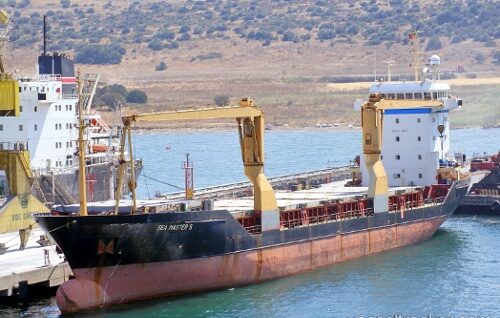
Black Sea feeder delivers first containers to Ukraine in two years
A vessel chartered by a Turkish freight forwarder delivered the first boxes to Ukraine’s Black Sea ports in Greater Odessa since the war began in February 2022, marking a significant increase in country’s capacity to handle goods into and out of its ports.
The Panamanian flagged general cargo vessel T-Mare, owned by Majoris Trading of the Marshall Islands, was chartered, on 1 February according to VesselsValue data, by freight forwarder Sea Pioneer Denizcilik, headquartered in Istanbul to operate a feeder service between Constanta and ports in Odessa.
The 373 teu T-Mare made its first call at Chornomorsk on 3 April and the ship, which also has 40 reefer plugs, was carrying mainly Maersk cargo, which still will add to the Danube River container services the carrier is still operating, expanding Ukraine’s ability to import and export vital cargoes, including grains, metals and chemicals.
The Panamanian flagged general cargo vessel T-Mare, owned by Majoris Trading of the Marshall Islands, was chartered, on 1 February according to VesselsValue data, by freight forwarder Sea Pioneer Denizcilik, headquartered in Istanbul to operate a feeder service between Constanta and ports in Odessa.
The 373 teu T-Mare made its first call at Chornomorsk on 3 April and the ship, which also has 40 reefer plugs, was carrying mainly Maersk cargo, which still will add to the Danube River container services the carrier is still operating, expanding Ukraine’s ability to import and export vital cargoes, including grains, metals and chemicals.
The ship returned to Constanta on the same day and could mark a ‘safe corridor’ for containers following Russia’s decision not to renew the grain corridor agreement in the summer of last year.
Daniil Melnychenko, an analyst with Ukrainian consultancy Informall, said: “Up to now, container transportation has been carried out to a limited extent through Danube ports, but from today it will increase significantly.”
Melnychenko recalled that the Deputy Minister of Infrastructure Yuriy Vaskeov had announced last month, that all five Greater Odessa regional container terminals were ready to process boxes, but he said they will resume operations in stages.
“The traffic was supposed to start with the feeder ships, and container lines would follow them in the absence of incidents,” said Melnychenko. The analyst also said there was a possibility that a second feeder vessel could be added to the service if it proves successful.
Added container was desperately needed by both shippers and forwarders whose only outlet has been via trucks across the country’s western and southern borders or via barge on the Danube River, which is limited and comparatively slow. However, Melnychenko expects container lines will utilise the feeder service if it proves safe.
Russia’s military were opposed to the use of containers for the controlled corridors because they feared that arms and equipment for the war effort could be smuggled into the Ukraine.
Ukraine has successfully operated its safe corridor since the autumn of last year with bulk carriers utilising Odessa’s ports comparatively safely.
Turkish liner operator Akkon Lines and Maersk are the only container lines to continue to handle containerised cargo on the Danube River using rail and barge operations, both are expected to be involved in the development of the feeder service.

